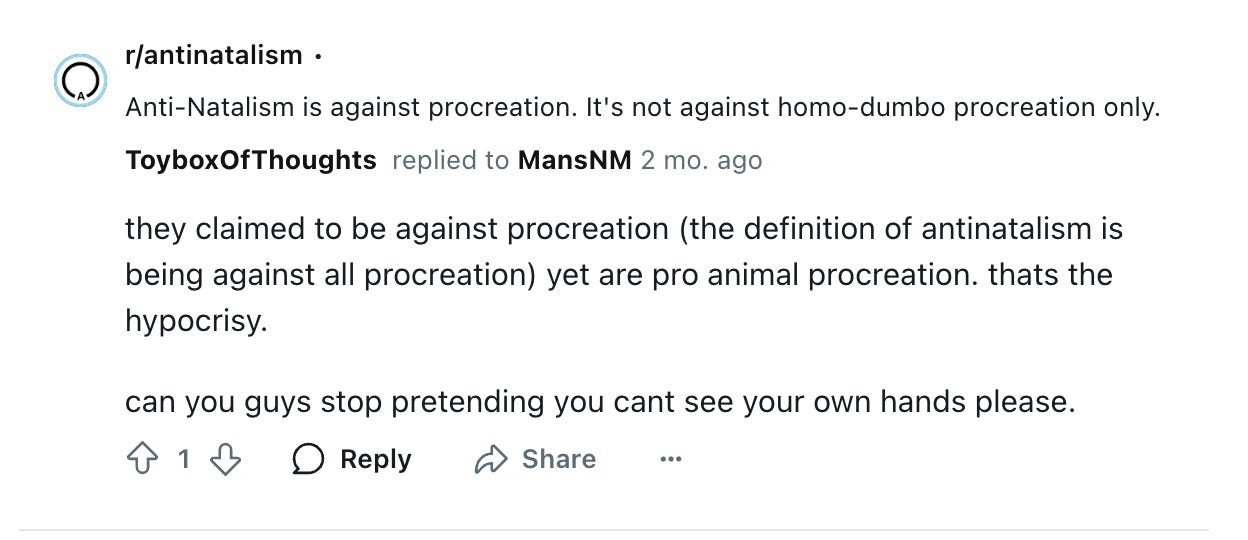On Saturday morning, a parked SUV exploded outside the American Reproductive Centers fertility clinic, killing its driver and wounding at least four bystanders. Federal agents branded the blast an act of terrorism aimed at in-vitro fertilization. Shortly after, a bare-bones website—promortalism.com—surfaced, where the bomber, 25-year-old Guy Edward Bartkus, condemned “the disease of life,” and urged visitors to mirror and share “the recorded stream of my suicide & bombing” before censors intervened.
Bartkus’s rhetoric will be familiar to not only anyone who’s followed my reporting on efilism and promortalism, but anyone who has watched the strange after-life of utilitarianism (and early heterodox YouTube debate culture) on the Internet unfold. What you see in efilism is something you see across the web—a distinct style of moral bookkeeping.
Effective Altruists have shrimp welfare. Silicon Valley’s Rationalists and other AI doomers extend the same habit to AI: if an unfriendly super-intelligence might one day turn the universe into paperclips, as Nick Bostrom’s 2003 thought experiment warned, then every present choice must be tallied against that cosmic risk. It’s unusual, occasionally antisocial, and can take us to some very dark places.
(Because I’m Falling Asleep But Understand the Urgency of Publishing This Now)
In 2006 the South African philosopher David Benatar published Better Never to Have Been, arguing that existence itself is harm, because, according to him, the absence of pain is always good while the absence of pleasure matters only to someone forced to miss it. His book supplied the term antinatalism and the asymmetrical equation that sustains it:
Benatar’s argument drifted onto early YouTube—in a swamp of heterodox debating, particularly centered around New Atheism—where a user called DerivedEnergy posted a two-part “Defense of Antinatalism,” inviting other YouTubers to debate him, back when people made reply videos.
More radical voices soon arrived.
To make a long story short—too short, in fact, there’s a documentary worth of story in this—Gary Mosher, an irascible vlogger best known as Inmendham, ended up coining efilism—“life” spelled backwards—during this period to insist that every sentient organism is a factory for pain and ought to be snuffed out.
A rebuttal video, In the Name of Efilism, shows where the logic—or rather, illogic—of efilism leads: if speed is the paramount good, lining people up at a trench can outrank painstaking hospice care. Mosher himself acknowledges he would finish the job “as crude as I have to… I really don’t care about aesthetic crapola,” even musing that a handful of continental-shelf nuclear detonations might suffice.
Efilism recasts ongoing life as an emergency whose only adequate remedy is species-wide euthanasia—an ethic that, in Palm Springs, moved a seed from YouTube debate culture to a car bomb on an ordinary Saturday morning.
Readers of my work will know that Mosher’s tirades fascinated the Sandy Hook gunman Adam Lanza whose own YouTube videos riffed on efilism. He would eventually come up with his own, related, ideology called “eulavism,” which instead of being just against life, was against values.
Bartkus cites Lanza as an inspiration.
The slope steepened again with promortalism: if life is nothing but harm, why endure it? Bartkus claimed he was an efilist and promortalist. In his view, the Palm Springs blast was therefore not an outburst but, in the bomber’s arithmetic, it was another tally in a game of suffering avoided.
Reading this may call to mind another, similar group: the militantly anti-suffering Zizians. (Compare this antinatalist open letter warning antinatalists about efilism to the one circulated among Rationalists about Zizians.)
Like Bartkus, the Zizians justify violence through this same moral bookkeeping, not hatred or even nihilism. The same intellectual route—Benthamite utility, rationalism, cost-benefit—ends for them in ideas about pre-emptive self-defense against an unjust world.
Of course, there’s always a certain lack of self-awareness in these things.
Bartkus’s suicide landing page reads:
I've known for a few years now I wasn't going to allow myself to make it past my 20s. Recently my best friend Sophie killed herself (she got the guy she was living with to shoot her while she was sleeping, her preferred method), and I don't think I really knew how much it was going to affect me. I've never related to someone so much, and can't imagine I ever would again.
We were both antisex (don't mistake for asexual, I'm talking like r/antisex) misandrists, VegAntinatalist, negative utilitarians. Both also had borderline personality "disorder".
Anyways, we got along quite well and it was very nice, especially when you feel like you are in an apocalypse and nobody else seems to get anything. IIRC we had agreed that if one of us died, the other would probably soon follow. It's just too much of a loss when there's nobody else you really relate to significantly. Since she's dead, I'll link her reddit and tiktok where she made a few videos. She also had a tumblr account that she was very active on. She used to have more videos on her YouTube account but I guess she hid them before.
It’s too early to say definitively, though writing this I realize I really should be doing a background check on this guy, but his turn toward violence seems not to have been because of efilism but because of grief. The suicide of his closest friend cracked something open, and the ideology drifted in afterward, less a cause than a vocabulary for feelings he already had.
That raises the usual question of “radicalization,” but the answer here is complicated. Plenty of people wander through fringe ideologies almost as "emotional third spaces” or as hobbyist forums. Most of these people never hurt anyone and never will. What distinguishes the handful who do isn’t the zeal of a jihadist—it isn’t even, strictly speaking, belief. It seems to be either something deeply emotional—and for that matter, interpersonal—or a stark nihilism.
In other words, Bartkus didn’t attack the clinic because he genuinely wanted to minimize suffering; he did it because, after his friend’s suicide, he no longer saw any reason to keep living himself. The very fact that another person’s absence could break him so completely exposes the contradiction in his stated belief system.
It shows, however bleakly, that life—and connection—still mattered to him.
Update — 5/18/2025 — 8:15 AM CT:
In Mosher’s response video to the IVF bombing, he condemns Bartkus’s actions, much like he condemned Lanza when people began drawing parallels there. It’s complicated. I’m not sure he should be held accountable for everything he’s ever said on stream. He often rambles and, frankly, talks out of his ass.
Take the stream below (or this supercut), for example, with Amanda Sukenick, who is both an efilist and antinatalist—arguably the second most well-known figure in each movement. Mosher is flippant. He says he doesn’t care. If someone causes harm to a Mengele-like figure because of the amount of suffering that person has caused themselves. He argues why should he feel sympathy if they’re killed? That’s not exactly a call to violence. But efilism is, in many ways, an explosion of Mosher’s inner world—lacking consistent structure or principle.
On one hand, maybe it doesn’t need to be. On the other, how much responsibility do we bear for our followers when we have large platforms that promote, to put it charitably, out-of-the-box thinking?
Watch on YouTube here if the embedded video doesn’t show up for you.
.png)







